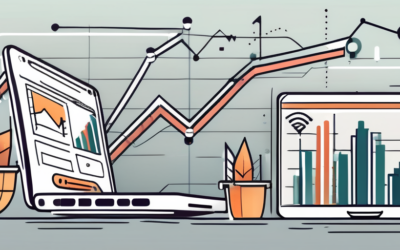In today's rapidly changing business landscape, sustainable growth is no longer just a buzzword – it's a necessity. Startups and Small and Medium-sized Enterprises (SMEs) need to implement effective strategies that allow them to grow in a way that is both financially and operationally sustainable.
This article explores various approaches to achieving sustainable growth, from understanding the concept to overcoming challenges and engaging stakeholders. By adopting these strategies, startups and SMEs can build a strong foundation for long-term success.
Understanding Sustainable Business Growth
Before diving into the strategies, it is crucial to comprehend what sustainable business growth entails. It means achieving growth while minimizing negative environmental, societal, and resource impacts. It involves creating a balanced approach considering the triple bottom line – people, planet, and profit. By prioritizing sustainability, startups and SMEs can establish themselves as responsible corporate citizens.
One way to promote sustainable business growth is by adopting a circular economy approach. This involves designing products and services that can be reused, recycled, or repaired, thus reducing waste and minimizing the need for new resources. By embracing this model, companies can reduce their environmental footprint and uncover new business opportunities.
Moreover, sustainable business growth goes beyond just environmental considerations. It also encompasses social responsibility. Companies that prioritize the well-being of their employees, customers, and communities are more likely to build long-term relationships and maintain a positive reputation. This can increase customer loyalty, employee satisfaction, and overall business success.
Strategies for Financial Sustainability
Achieving financial sustainability is a critical aspect of sustainable growth. Startups and SMEs must carefully manage their finances to continue operating and growing long-term. One strategy for financial sustainability is to diversify revenue streams. Relying on a single source of income can be risky, so businesses should explore multiple avenues, such as offering additional products or services or targeting new customer segments.
In addition to diversifying revenue streams, startups, and SMEs can consider alternative funding options. Crowdfunding, impact investing, and grants are just a few examples of sources of capital that align with sustainable business practices.
In seeking these opportunities, businesses can secure the financial resources they need to fuel their growth while staying true to their sustainability goals.
Another critical element of financial sustainability is managing costs effectively. Startups and SMEs should regularly assess their expenses and identify areas where they can cut unnecessary costs. This could involve renegotiating contracts, streamlining operations, or implementing energy-saving measures. By reducing expenses, businesses can allocate more resources to fund growth initiatives.
Strategies for Operational Sustainability
Operational sustainability focuses on optimizing processes and reducing waste throughout the value chain. One effective strategy is to implement lean methodologies, such as Just-in-Time (JIT) inventory management. By minimizing inventory levels and improving production efficiency, startups, and SMEs can reduce waste and increase productivity.
Furthermore, embracing digital technologies can enhance operational sustainability. Automation, cloud computing, and data analytics can streamline operations, improve decision-making, and reduce the environmental impact associated with traditional practices. Adopting digital solutions enables businesses to scale rapidly without significantly increasing their resource consumption.
Moreover, operational sustainability can also be achieved through collaboration and partnerships. By working together with suppliers, customers, and other stakeholders, businesses can identify opportunities for joint initiatives that promote sustainability. This can involve sharing best practices, pooling resources, and collectively addressing everyday challenges.
Sustainable business growth requires a holistic approach considering environmental, social, and financial factors. By adopting circular economy principles, diversifying revenue streams, managing costs effectively, implementing lean methodologies, embracing digital technologies, and fostering collaboration, startups and SMEs can position themselves for long-term success while minimizing their impact on the planet and society.

Balancing Short-Term and Long-Term Goals
Achieving sustainable growth requires striking a delicate balance between short-term and long-term goals. While it may be tempting to focus solely on immediate results, startups and SMEs must also consider the long-term implications of their actions. It is essential to invest in strategies that not only drive short-term growth but also lay the foundation for sustainable success in the future.
One way to achieve this balance is by implementing a comprehensive business plan that outlines both short-term and long-term objectives. This plan should include specific targets for revenue growth, market expansion, and customer acquisition in the short term while also considering factors such as product development, talent acquisition, and brand building for long-term success.
Moreover, startups and SMEs should prioritize building a strong organizational culture that aligns with their long-term goals. This includes fostering a sense of purpose and shared values among employees and promoting a culture of innovation and continuous learning.
By investing in their workforce and creating a positive work environment, businesses can ensure that a motivated and engaged team supports their long-term goals.
Developing a clear vision and long-term strategy is crucial for startups and SMEs. By outlining their goals and aligning their activities accordingly, business owners can ensure that their growth efforts are sustainable rather than driven by short-term gains. Regularly reviewing and refining these goals is essential to adapt to an ever-evolving business landscape.
Innovating for Sustainable Development
Innovation plays a vital role in sustainable growth. Startups and SMEs should develop innovative solutions addressing pressing social and environmental challenges. By aligning their products or services with sustainable development goals, businesses can differentiate themselves in the market and attract socially conscious consumers.
For instance, a startup in the renewable energy sector can develop innovative technologies that harness solar or wind power, contributing to the global efforts to combat climate change.
By providing clean and sustainable energy solutions, the company drives short-term growth and contributes to the long-term goal of reducing carbon emissions and promoting environmental sustainability.
Collaboration and partnerships are also crucial in driving sustainable innovation. By working with other organizations, startups, and SMEs can combine their expertise and resources to develop innovative solutions that have a greater impact. These partnerships can also provide access to new markets or funding opportunities, further supporting sustainable growth.
Furthermore, startups and SMEs can leverage technology and digital platforms to drive sustainable innovation. For example, an e-commerce startup can implement sustainable packaging practices, such as using biodegradable materials or optimizing packaging sizes to reduce waste. By incorporating sustainability into their business operations, companies can attract environmentally conscious customers and contribute to a more sustainable future.
Achieving sustainable growth requires a careful balance between short-term and long-term goals. By investing in strategies that drive immediate results while considering the long-term implications, startups, and SMEs can lay the foundation for sustainable success.
Additionally, by focusing on innovative solutions that address social and environmental challenges, businesses can differentiate themselves in the market and attract socially conscious consumers—collaboration, partnerships, and leveraging technology further support sustainable growth efforts.
Scaling Your Business Responsibly
Scaling a business is an exciting phase, but it also brings its own set of challenges regarding sustainability. Startups and SMEs must ensure that their growth initiatives align with their sustainability goals rather than compromising them. Responsible scaling involves considering expansion plans' environmental, social, and economic impact.
One strategy for responsible scaling is to implement green practices throughout the supply chain. This could involve working with suppliers to prioritize sustainability, optimizing transportation routes to reduce carbon emissions, or incorporating renewable energy sources in operations. By integrating sustainability into every aspect of the business, startups, and SMEs can scale while minimizing their ecological footprint.
Managing Resources for Sustainable Growth
Efficient resource management is a crucial aspect of sustainable growth. Startups and SMEs need to be mindful of the resources they consume and explore ways to minimize waste. Implementing energy-saving practices, water conservation, and waste reduction strategies can significantly contribute to sustainable resource management.
Also, considering the entire lifecycle of products or services is essential. From sourcing raw materials to disposal, businesses should aim to minimize the environmental impact at every stage.
This could involve using recycled materials, designing products for durability and recyclability, or adopting a circular economy model. By implementing these resource management strategies, startups and SMEs can grow sustainably while preserving the planet's resources.
Building a Sustainable Brand and Reputation
A strong brand and reputation are invaluable assets for startups and SMEs. Building a sustainable brand differentiates a business from its competitors and attracts customers who align with its values. Startups and SMEs should integrate sustainability into their core identity and communicate their commitment to responsible business practices to target audiences.
Transparency is a critical element in building a sustainable brand. Startups and SMEs should be open about their environmental and social impacts and their efforts to mitigate them. Sharing success stories, milestones, and ongoing initiatives can create a sense of trust and authenticity, establishing the foundation for a sustainable brand and reputation.
Overcoming Challenges in Sustainable Business Practices
While striving for sustainable growth, startups and SMEs will inevitably face challenges. It is important to identify and address these challenges proactively to ensure continuous progress. One common challenge is lack of resources or expertise in sustainable practices. In such cases, seeking external support through partnerships, collaborations, or consulting services can provide valuable guidance.
Another challenge is navigating and complying with evolving regulations and standards. Startups and SMEs should stay updated on environmental and social rules relevant to their industry to ensure compliance. Additionally, leveraging certifications and labels demonstrating sustainability credentials can build credibility and facilitate market access.
Strategic management professor Frank Wijen dives deeper into this issue in the TEDTalk Below:
Engaging Stakeholders in Your Growth Journey
Engaging stakeholders is crucial for sustainable growth. By involving employees, customers, suppliers, and the broader community, startups and SMEs can build a support network and positively impact society and the environment. Communication and collaboration are essential to effective stakeholder engagement.
Startups and SMEs should involve employees in sustainability efforts by fostering a culture of sustainability and providing training on sustainable practices. Applying customers through education, awareness campaigns, and feedback mechanisms can create a loyal customer base that values the company's sustainable initiatives. Engaging suppliers through responsible sourcing requirements can also drive sustainability throughout the supply chain.
Furthermore, partnering with local communities and non-profit organizations can create mutually beneficial collaborations, benefiting the business and its society. By engaging stakeholders, startups and SMEs can amplify their impact and accelerate sustainable growth.
Sustainable growth strategies are essential for startups and SMEs seeking long-term success. By understanding the concept of sustainable business growth, balancing short-term and long-term goals, implementing financial and operational sustainability strategies, innovating for sustainable development, and overcoming challenges, businesses can build a solid foundation for growth.
By managing resources responsibly, building a sustainable brand, and engaging stakeholders, startups and SMEs can achieve sustainable growth while positively impacting society and the environment. Embracing sustainable growth strategies is crucial from an ethical standpoint and a strategic decision that can drive long-term profitability and resilience in today's competitive business world.
Explore the Path to Success with CorEthos
Thank you for journeying with us through this exploration of ideas. Your presence here is a testament to a shared passion for reimagining business, and it resonates with the very essence of CorEthos: bringing humanity back to business.
Perhaps the curiosity that brought you here still burns brightly, yearning for further discovery. In that case, we invite you to delve into our blog, where each article opens new doors to understanding, insight, and growth. They are tailored to leaders like you, eager to unravel the complex tapestry of today's business world.
If you find yourself intrigued by the delicate science behind communication and leadership, why not embark on a journey of discovery with our newsletter? Subscribing is like opening a treasure chest filled with wisdom that connects you to the essence of collaboration and community.
Intensify Your Leadership Journey with Our Mastermind Program
Our newly launched Mastermind Program provides a focused setting for tackling challenges like honing effectiveness, inspiring your team, and mastering the art of delegation. It's a unique space where business acumen meets human-centered values, delivered with the same quality and integrity you've come to expect from CorEthos. Ready to dive deeper into your leadership potential?
We Would Love to Get to Know Your Challenges Better!
Challenges in business? We see them not as stumbling blocks but as opportunities for transformation. Your unique path awaits, and it begins with a complimentary consultation with CorEthos. We'll build bridges over obstacles and forge a trail to success, leveraging our three foundational pillars.
Your adventure with CorEthos doesn't have to end here. Let's continue to build, learn, and grow together, reflecting on what makes your business uniquely human. We are here to be your compass, guiding you through the challenges and celebrating the triumphs. Let's begin this exciting journey today.



